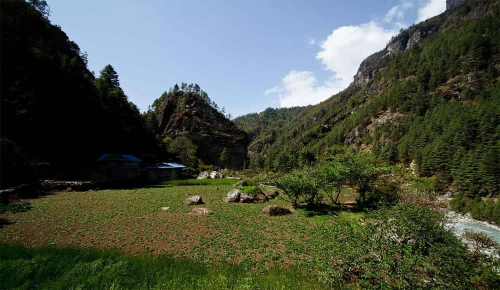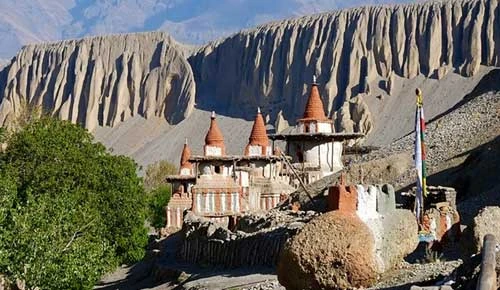Complete Guide: How to train yourself for Everest Base Camp (EBC) Trek?
Everyone has always dreamed of standing in front of the breathtaking Mount Everest once in their lives. The sheer size and breathtaking beauty of Mount Everest have long captivated adventurers and nature enthusiasts.
Trekking to Everest Base Camp is a moderately difficult high-altitude adventure that takes you to stunning snow-capped landscapes and the heart of the world's highest mountain ranges. The route offers scenic beauty along with physical challenges.

Here's the good news: with proper training, anyone with a desire to explore the base camp and a commitment to preparation can conquer it. The first thing that you need to consider, and that will make your trip successful, is a proper training plan. The training includes cardiovascular exercise, strength endurance, and hiking-specific training.
In the blog, we will discuss the complete guide to preparing yourself for the Everest base camp Trek.
Why prepare for the base camp?
Training for the base camp is not just for completing the journey but for a safe and enjoyable experience as well. Here are the reasons why proper training is required to reach base camp:
- To improve cardiovascular endurance
- To enhance strength and endurance
- Preparing for carrying a daypack uphill for long periods
- To adapt to high altitude challenges
- To reduce risk of altitude sickness
- Increase chances of completing the trek successfully
- Enjoy the trek with greater comfort and confidence
- Minimize physical strain and fatigue during the journey
- Maximize enjoyment of the scenic landscapes and cultural experiences
Table of Contents
Preparing Physically and Mentally for Everest Base Camp
Everest base camp journey required both physical and mental fitness. Preparing physically and mentally for the voyage is important for a successful and enjoyable journey. Intellectually, it's important to tackle the challenge with a positive attitude, create realistic goals, and focus on the process rather than the destination.
Whereas, physical training should include aerobic, strength, and flexibility exercises to increase endurance and strength and prevent injuries. A well-balanced training strategy prepares both the mind and body for the trek's difficulty.
Mental Preparation
Mental preparation is essential to reaching Everest Base Camp, whether it's a short Everest trek or a two week long base camp trek. It includes understanding the challenges, establishing realistic goals, and developing an optimistic outlook.
Understanding the Difficulty
Before starting the journey to base camp, it is important to have knowledge about difficulty. The trip is not just physically challenging but also mentally challenging. So before starting, it's important to know about difficult terrain, weather conditions, elevation gain, and altitude sickness during the trek.
This will mentally prepare you to face any obstacles that might occur during the trek. You can learn a lot about what to expect and how to mentally prepare for the journey by reading first-hand experiences, watching documentaries, and speaking with seasoned hikers.
Setting Realistic Goals
Achieving success on the journey to Base Camp requires setting realistic goals. Although reaching the world's highest peak's base camp is an incredible accomplishment, it's crucial to break down the trek into smaller milestones.
Whether the goal is to simply reach the next rest stop, finish a certain section of the trek, or reach a given height each day, creating practical goals can help to maintain motivation and prevent getting overwhelmed. Planning a practical goal will allow you to concentrate on improving steadily without putting too much pressure on yourself to enjoy the process too much.
Developing Positive Mindset
A positive mindset is the most important asset for the trip to base camp. Positivity not only promotes morale but also builds resilience in the face of hardship. It takes gratitude exercises, success visualizations, and revising setbacks as chances for development to cultivate a positive mindset.
It's crucial to realize that the trek will be difficult, but keeping a positive attitude can make all the difference. Surrounding yourself with encouraging people, participating in positive self-talk, and remaining flexible to change all contribute to a strong and positive mindset that will see you through the toughest parts of the journey.
Physical Preparation
Getting physically prepared involves building a solid foundation for the upcoming journey to base camp. This should be completed 4 to 8 weeks before the trip. This phase focuses mostly on improving cardiovascular endurance, which is required for acclimation to high altitudes and maintaining stamina throughout the trek. Your heart and lungs will work much better if you do activities like brisk walks, running, swimming, and cycling. Also, combining strength training routines that target your lower body and core will improve your stability and endurance on rough terrain.
Cardiovascular Endurance Training
Cardiovascular endurance training is all about getting your heart and lungs in shape for the journey. Think of it as preparing your body's engine to keep chugging along during those long days of hiking at high altitudes.
It's like training your body to handle the demands of the trek one step at a time. You might also want to mix things up with interval training, where you alternate between periods of faster, more intense exercise and slower recovery periods. This resembles the kind of terrain and altitude changes you'll face on the trek, helping to boost your overall endurance and resilience.

Try to do cardio exercises 3-4 times each week, but make sure to give yourself some days off to rest and recover. It's important to keep up with your cardio workouts regularly. By doing this, you'll be getting your body ready to handle the challenges of Everest Base Camp.
Why is cardio the king for EBC?
Here are the reasons and advantages for the trip to EBC:
- Cardio makes your heart and lungs stronger for hiking at high altitudes.
- It helps you breathe better when there's less oxygen up high.
- Your heart stays healthy, which is important for trekking long distances.
- It helps your muscles get the oxygen they need, making it easier to climb and walk.
- Doing cardio helps your body adjust to high altitudes, so you're less likely to get sick.
Cardio Fitness Activities
Luckily, there are numerous activities you can do to get in shape for the trip and improve your cardiovascular fitness:
- Brisk walking: It is an easy-to-do workout that makes your heart stronger and helps you burn fat. Start with shorter walks and slowly add more time and effort as your fitness level rises.
- Running: It is a great way to get stronger and last longer. Start with shorter lengths and make them longer as you get stronger. For an extra task, think about adding hills.
- Swimming: It is a low-impact activity that works out your whole body without hurting your joints. This is a great activity for people who are healing from injuries or just want to try something new.
- Biking: It makes your leg muscles stronger and your heart healthier. If you can, walk on trails to get a feel for the rough terrain you'll be facing on the trip.
Key Tips for Training
- You can start with activities you enjoy, like walking, cycling, or swimming.
- You can slowly increase the intensity and duration of your workouts over time.
- You can combine your routine with interval training to simulate the varied terrain of the trek.
- Aim for at least 30 minutes of aerobic exercise most days of the week.
- Listen to your body and rest when needed to avoid overtraining.
- Stay hydrated and fuel your body with nutritious foods to support your workouts.
- Consider cross-training with activities like hiking or stair climbing to build endurance.
Strength Training
Strength training is like developing a strong foundation for the challenges that await you on the Everest Base Camp trip. It's more than just shaping muscles; it's about developing the strength and resilience required to handle the rough terrain and carry your stuff comfortably.

Whether you're in the gym or working out at home, focus on exercises that target important muscular groups such as the legs, glutes, core, and upper body. The activities should be done 2-3 sessions/week
Advantages of Strength Training
- Increased muscle mass, which helps in better metabolism, burning more calories at rest.
- Strength training helps combat bone loss, reducing the risk of osteoporosis.
- Daily tasks become easier, and you'll move with more confidence.
- It helps to reduce Risk of Injury
- Stronger muscles and bones can better handle everyday stress.
- Improved balance and coordination, which leads to a lower risk of falls, especially in older adults.
- A strong core improves posture, leading to less back pain.
- Training helps boost mood and confidence, as feeling stronger can translate to a positive mental outlook.
Activities for Strength Training
Here are some crucial ideas to help you start your strength training journey:
- Bodyweight Exercises: Push-ups, squats, lunges, planks, and rows are all excellent bodyweight exercises you can do anywhere.
- Resistance Bands: These inexpensive tools add variety and challenge to bodyweight exercises.
- Dumbbells and Weights: As you progress, consider lightweight dumbbells or kettlebells.
Key Principles for Training
Here are some key pointers to kickstart your strength training journey:
- Don't overwhelm yourself with heavy weights or complex routines. Begin with bodyweight exercises or lighter weights to learn proper form.
- Proper form is crucial to prevent injury and maximize your workout. Consider working with a trainer initially to learn proper technique.
- Prioritize compound exercises that work multiple muscle groups at once, like squats, lunges, push-ups, rows, and overhead presses.
- Gradually increase the weight, sets, or reps over time to keep challenging your muscles and promoting growth.
- Take rest days when needed and avoid pushing yourself to the point of pain.
Flexibility and Mobility Preparation
Flexibility and mobility exercises are like giving your body a good stretch and making sure it moves well. These exercises are very helpful for preparing for the Everest Base Camp Trek. Generally, 3–4 sessions per week are a good start for preparation. If you are busy and have work, then 2 to 3 sessions a week can also make a difference.

Advantages
- Doing the training can create less chance of getting hurt as you will be more flexible while trekking in difficult terrains.
- Being more flexible means you can move your body more easily. This helps a lot when you're trying to climb over rocks or keep your balance on bumpy trails.
- lexibility exercises can help fix your posture and make it easier to stand up straight. That means less strain on your back and joints.
- Some of these exercises help you relax and take away stress. So, they're not just good for your body but also for your mind.
Activities for Preparation
Here are a few activities you can do during your flexibility and mobility training:
- Stretching: Give your back, arms, and legs some easy stretches. Hold each stretch for a short time so that you can feel a light pull. Do not push too hard, though.
- Yoga: Do some easy exercises like downward dog or forward fold. Yoga poses are great for getting flexible and calming down.
- Pilates: These workouts focus on strengthening your core while also improving your movement. They should be a part of your routine.
- Foam rolling: Place a foam roller over your muscles to ease them up and make them feel better. You can think of it as a massage
Key Tips for the Preparation
- Warm up your muscles a bit before you start to stretch. It keeps people from getting hurt.
- Do not force yourself to stretch. Don't go any further than you feel comfortable with.
- Do some activities to improve your flexibility a few times a week.
- To keep your body healthy, make sure you do both strength and flexibility workouts at different times.
- After your hike, don't forget to stretch to help your muscles feel better and rest.
Trek-Specific Training
As you move to higher speeds for your trek, this phase is all about practicing what it will be like to go on the actual trip. The length and distance of your hikes should be gradually increased, and if you can, you should include uphill sections. It's also important to get comfortable with carrying weight. During training hikes, gradually increase the weight of your backpack by up to 15 pounds to prepare your body for the trek's challenges.

Training to hike and climb is like getting ready for a big trip at Everest Base Camp. It gives you a chance to enjoy being outside, get used to traveling far, and do so.
Advantages Trek-Specific Training
- Practising hiking and climbing makes your body stronger and you will be ready for your upcoming trek to base camp.
- Being outside in nature can make you feel happier and less stressed, which is helpful for the tough parts of the trek.
- During this phase of preparation, you can test your gear, like shoes, backpacks, and clothes, which will help you know if your gear is comfortable or not.
- Hiking and climbing will also help in reading and finding your way, which can be a plus point while trekking in remote areas.
- It also helps your body adjust to higher places, which is important for avoiding altitude sickness.
Activities Trek-Specific Training
- Short Hikes: Begin with short, easy walks and build up to longer, faster ones.
- Camping: Spend a night outdoors to get used to sleeping and setting up camp.
- Walking Uphill: Plan some parts of your walks that go uphill to get ready for the steep parts of the trail.
- Weight to Carry: Weight your pack to get used to carrying the things you'll need for the journey.
Key Tips Trek-Specific Training
- Begin with easy hikes and gradually progress to more difficult ones as you improve your fitness.
- When you go hiking, make sure you have water and snacks with you.
- Wear layers to stay dry and comfortable.
- Make sure to clean up after yourself and leave the environment as you found it.
- Take breaks if you need to and pay attention to how you feel.
Training Plans
If you are worried or don't know how to make a training schedule, you can use our timetable to make your own preparations easier and more effective. Our training program aims to prepare you both physically and mentally for the challenges of Base Camp.
There are three parts to the training plan for Everest Base Camp: pre-training, training, and tapering. During pre-training, do cardio and muscle training to build a solid base of fitness. During the training part, you should do some hiking to get used to the conditions of the trek.
During the tapering phase, you will do fewer workouts in the weeks before the trek so that your body can rest properly. Some examples of workouts are cardio, strength training, and hiking. Altitude training helps your body get used to being at higher altitudes, which makes sure you have a good trek. Below, we have designed the best training program plan for the upcoming EBC trip.
Training Phase | Session 1 | Session 2 | Session 3 | Session 4 | Rest Days |
Pre-training Phase | Cardiovascular workout (30 minutes) | Strength training (30 minutes) | Rest or light activity | Cardiovascular workout (30 minutes) | 2 rest days |
Training Phase | Hiking or trekking practice (2-3 hours) | Cardiovascular workout (30-45 minutes) | Strength training (30-45 minutes) | Rest or light activity | 2 rest days |
Tapering Phase | Shorter hikes or light cardio (1-2 hours) | Strength training (20-30 minutes) | Rest or light activity | Rest or light activity | 3 rest days |
Concluding the Everest Training Journey
Preparing yourself for every journey is a must for everyone. It doesn't matter if you are an experienced hiker or a beginner, old or young; everyone should be mentally and physically fit to achieve their goal.
If you are planning to start a trip to the Everest region, then it is a must to prepare for it. Through our blog, you will gain knowledge about the difficulty of the base camp and how you can prepare yourself for it. If you plan to participate in the trekking programs listed below, this training will be beneficial.








